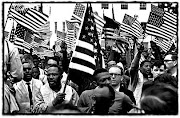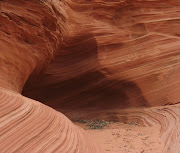 Nobody can call Burma's monks cowards. After a bloody massacre, untold missing and junta crackdown with countless arrests, monks take to the streets of central Burma again in defiance. Admittedly not in throngs of thousands, but 1oo brave monks protested. Their timing is exquisite and painful to the military strong man as the UN's liaison, Ibrahim Gambari, returns to ascertain progress by Saturday. The totalitarian government of Myanmar suffered an international rebuke from the permanent members of the UN Security Council, including their patron, China. Now the draft is in Burma with boy soldiers filling the ranks of the military.
Nobody can call Burma's monks cowards. After a bloody massacre, untold missing and junta crackdown with countless arrests, monks take to the streets of central Burma again in defiance. Admittedly not in throngs of thousands, but 1oo brave monks protested. Their timing is exquisite and painful to the military strong man as the UN's liaison, Ibrahim Gambari, returns to ascertain progress by Saturday. The totalitarian government of Myanmar suffered an international rebuke from the permanent members of the UN Security Council, including their patron, China. Now the draft is in Burma with boy soldiers filling the ranks of the military.To make sure that the junta got the message, the rang up a radio station to make sure their deed did not go unnoticed. Media savvy monks against the heavy-handed armed militia of a strongman is causing angst in international circles. A junta demanded large crowd cheering photo-op, staged by the government, was the catalyst to bring about further public dissension from the monks in Pakakou, the same place where it all began before. The economic crisis brought about by the governments ham-fisted mismanagement remains central to the resolution with inflated fuel costs continuing to rise.
Japan, deeply wounded by the killing on television of an unarmed journalist, has reflected upon its economic ties to the harsh Myanmar government they support. The government was able to keep India, China and Japan fairly removed before the monks protests became a global story. Burma is in crisis and external forces have investments they still want returns from that would be difficult to obtain if the government became democratized. The continued detainment of Nobel Peace Prize winner Aung Sang Suu Kyi remains contentious as the jaded junta leader, General Than Shwe, is being soundly beaten at the PR game by a tiny fragile women kept locked away in her house.Britain's ambassador to Burma, Mark Canning, said yesterday: "It's not a great surprise they have come back on to the streets because the underlying political and economic forces driving this have not gone away. The economic and political frustration that is within the population will manifest itself again in the coming months, but how and to what scale is unclear."
The protests came hours after the Burmese junta released seven members of Aung San Suu Kyi's National League for Democracy, who had been held for more than a month in Rangoon's notorious Insein jail.
 The UN Secretary-General is demanding substantive progress as his Special Envoy completes a tour of Burma's powerful Asian neighbors. As a show of responsiveness the junta is releasing handfuls of recently arrested political prisoners in drips and drabs from a hellish confinement to show the level of seriousness he's taking the UN. Monasteries have been shuttered and closed off from the public. New aggravations are the alleged abductions of children to swell the ranks of the military with the added benefit of keeping the thousands of worried parents under control. Than Shwe, tinpot dictator, is in no danger of being held in the high esteem as his country's most famous residents, the marching monks and Daw Aung Sang Suu Kyi.
The UN Secretary-General is demanding substantive progress as his Special Envoy completes a tour of Burma's powerful Asian neighbors. As a show of responsiveness the junta is releasing handfuls of recently arrested political prisoners in drips and drabs from a hellish confinement to show the level of seriousness he's taking the UN. Monasteries have been shuttered and closed off from the public. New aggravations are the alleged abductions of children to swell the ranks of the military with the added benefit of keeping the thousands of worried parents under control. Than Shwe, tinpot dictator, is in no danger of being held in the high esteem as his country's most famous residents, the marching monks and Daw Aung Sang Suu Kyi.One of the most famous films ever about Burma is the building of the Burma-Siam rail section by US and other prisoners of war. The 1957 famed film is Bridge on the Kwai starring William Holden and Alec Guinness.











No comments:
Post a Comment